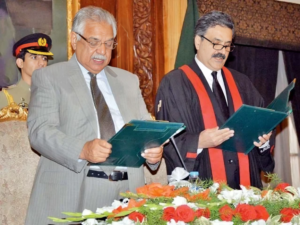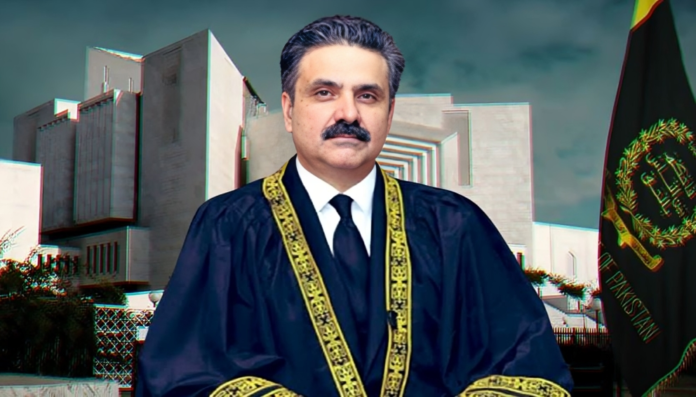In a pivotal move, Justice Yahya Afridi, currently the third in seniority on the Supreme Court (excluding the incumbent Chief Justice of Pakistan), has been nominated to become the next Chief Justice. This decision came on Tuesday during a late-night session where a newly formed parliamentary panel approved his nomination with a two-thirds majority.
The nomination of Justice Yahya Afridi was announced by Law Minister Azam Nazeer Tarar following an in-camera meeting of the special parliamentary committee at Parliament House. The panel, composed of both government and opposition members, selected Afridi from a list of three candidates. However, PTI boycotted the proceedings in protest against the recent constitutional amendments that created the committee.
Despite PTI’s absence, nine members of the committee met and voted, with eight in favor of Justice Yahya Afridi, while JUI-F leader Kamran Murtaza was the lone supporter of senior puisne judge Mansoor Ali Shah. The committee’s decision will now be forwarded to the National Assembly Speaker, who is expected to send it to the Prime Minister for final approval today (Wednesday).
Khawaja Asif, Ahsan Iqbal, Shaista Pervaiz, Raja Pervez Ashraf, Syed Naveed Qamar, Rana Ansar, Farooq H. Naek, Azam Nazeer Tarar, and Kamran Murtaza participated in the crucial meeting. PTI’s members—Barrister Gohar Ali Khan, Hamid Raza, and Barrister Syed Ali Zafar—chose to boycott the session, reflecting the party’s discontent with the panel’s legitimacy.
The meeting, initially scheduled for 4:00 PM, was delayed to 8:30 PM after PTI and Sunni Ittehad Council members failed to show up. The committee paused its proceedings until later that evening, but PTI lawmakers refused to join despite efforts by senior political leaders to bring them on board. A sub-committee, including Ahsan Iqbal and Rana Ansar, sought to negotiate with PTI’s representatives, but their appeals were turned down.
The absence of PTI did not halt the process. After the decision was made public, the Sindh High Court Bar Association issued a statement welcoming the nomination of Justice Yahya Afridi, hailing it as a significant step forward for the judiciary.
Career Overview of Justice Yahya Afridi

Early Life and Legal Education
Justice Yahya Afridi has built an esteemed career in Pakistan’s judicial system, marked by his commitment to justice, integrity, and rule of law. Born into a respected family in Khyber Pakhtunkhwa, Afridi began his legal career after completing his education in Pakistan and furthering his legal studies abroad.
Advocate at Peshawar High Court
He initially served as an advocate at the Peshawar High Court, where his dedication and legal acumen quickly gained recognition. In his early years, Afridi worked on a range of cases, handling constitutional, civil, and criminal matters. His strong understanding of the law, combined with a reputation for fairness, earned him widespread respect within the legal community.
Appointment as Judge of Peshawar High Court
Afridi’s judicial journey took a significant leap when he was appointed as a judge of the Peshawar High Court in 2014. During his tenure, he became known for his progressive and insightful judgments, particularly in cases involving human rights and constitutional law. His balanced and impartial decisions often reflected his deep understanding of the complexities of Pakistan’s legal system.
Elevation to the Supreme Court of Pakistan
In 2017, Justice Yahya Afridi was elevated to the Supreme Court of Pakistan, where he has continued to serve with distinction. As a Supreme Court judge, Afridi has been involved in several high-profile cases, where his contributions have shaped key judicial decisions. His judgments demonstrate a strong commitment to the protection of fundamental rights and the preservation of democratic principles.
Notable Contributions and Judicial Philosophy
Throughout his career, Justice Yahya Afridi has been praised for his impartiality, legal expertise, and dedication to upholding the Constitution of Pakistan. His decisions reflect his strong understanding of the law and his deep commitment to human rights and democratic values.
Nomination as Chief Justice of Pakistan
His reputation as a principled and diligent judge has led to his nomination as the next Chief Justice of Pakistan, a role that many believe he is well-equipped to fulfill, given his vast experience and judicial philosophy.


